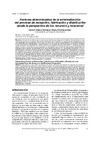Identificador persistente para citar o vincular este elemento:
https://accedacris.ulpgc.es/jspui/handle/10553/60262
| Campo DC | Valor | idioma |
|---|---|---|
| dc.contributor.author | Rodríguez Díaz, Manuel | en_US |
| dc.contributor.author | Espino Rodríguez, Tomás Francisco | en_US |
| dc.date.accessioned | 2020-01-17T12:58:12Z | - |
| dc.date.available | 2020-01-17T12:58:12Z | - |
| dc.date.issued | 2006 | en_US |
| dc.identifier.issn | 1019-6838 | en_US |
| dc.identifier.other | Dialnet | - |
| dc.identifier.uri | https://accedacris.ulpgc.es/handle/10553/60262 | - |
| dc.description.abstract | El propósito de este estudio es examinar los factores que influyen en la decisión de externalizar las operaciones del proceso de recepción, fabricación y distribución de los pedidos. La mayoría de las investigaciones han sido analizadas bajo la perspectiva de los costes de transacción, siendo la especificidad el factor más estudiado a la hora de explicar la externalizacion. A este respecto y en un intento de cubrir este gap en la literatura, el trabajo analiza el proceso de externalización desde la visión de la empresa basada en los recursos y la perspectiva relacional. Por tanto, en función de esta perspectiva se han tomado como referencia otras variables que pueden ser explicativas de la decisión de externalizar como las competencias básicas, las capacidades relacionales y la competitividad de la actividad. Asimismo se analiza la relación existente entre el proceso de externalización con el ámbito geográfico y el volumen de facturación. Los resultados reflejan que el resultado de la actividad y la posibilidad de establecer capacidades relacionales son los factores que más influyen en el proceso de externalización más que el hecho de que una operación pueda ser valiosa o generar competencias básicas para la organización. Asimismo se demuestra la existencia de una relación positiva entre el ámbito geográfico en el que opera la empresa y el volumen de facturación y la externalización del proceso de recepción, fabricación y entrega de pedidos. | en_US |
| dc.language | spa | en_US |
| dc.relation.ispartof | Revista Europea de Direccion y Economia de la Empresa | en_US |
| dc.source | Revista europea de dirección y economía de la empresa[ISSN 1019-6838],v. 15 (4), p. 33-54 | en_US |
| dc.subject | 530404 Comercio exterior | en_US |
| dc.subject.other | Externalización de servicios | en_US |
| dc.subject.other | Distribución de pedidos | en_US |
| dc.subject.other | Facturación | en_US |
| dc.subject.other | Outsourcing | en_US |
| dc.subject.other | Distribution of orders | en_US |
| dc.subject.other | Turnover | en_US |
| dc.title | Factores determinantes de la externalización del proceso de recepción, fabricación y distribución desde la perspectiva de los recursos y relacional | en_US |
| dc.type | info:eu-repo/semantics/article | en_US |
| dc.type | Article | en_US |
| dc.identifier.url | http://dialnet.unirioja.es/servlet/articulo?codigo=2150034 | - |
| dc.description.lastpage | 54 | - |
| dc.identifier.issue | 4 | - |
| dc.description.firstpage | 33 | - |
| dc.relation.volume | 15 | - |
| dc.investigacion | Ciencias Sociales y Jurídicas | en_US |
| dc.type2 | Artículo | en_US |
| dc.description.notas | The purpose of this study is to examine the factors influencing the decision to outsource the process of receipt, manufacture and delivery of orders. Most research into outsourcing decisions and their determinants has been performed from the view of the transactions costs theory, mainly by analyzing specificity as the most important factor at the time of taking the outsourcing decision. In this respect, and in an attempt to fill this gap in the literature, this work analyzes the outsourcing process from the relational and resource-based view Therefore, and from these perspectives, other variables that may explain the decision to outsource have been taken as a reference. These variables include the core competences, relational capabilities and the competitiveness or performance of the activity. This work also contains an analysis of the relationship between the outsourcing process and both the geographical area and the turnover .The results reflect that the operation performance and the possibility of establishing relational capabilities are the factors that most influence the outsourcing of the process under study, rather than the fact that the operation may be valuable or generate core competences for the firm. It is also shown that the geographical area and the turnover both have a positive relationship with the outsourcing of the process of reception, manufacture and distribution of orders. | en_US |
| dc.contributor.authordialnetid | No ID | - |
| dc.contributor.authordialnetid | 199036 | - |
| dc.identifier.dialnet | 2150034ARTREV | - |
| dc.utils.revision | Sí | en_US |
| dc.identifier.ulpgc | Sí | es |
| item.grantfulltext | open | - |
| item.fulltext | Con texto completo | - |
| crisitem.author.dept | GIR Organización y dirección de empresas (Management) | - |
| crisitem.author.dept | Departamento de Economía y Dirección de Empresas | - |
| crisitem.author.dept | GIR IUCES: Estrategia y Negocios Internacionales | - |
| crisitem.author.dept | IU de Cibernética, Empresa y Sociedad | - |
| crisitem.author.dept | Departamento de Economía y Dirección de Empresas | - |
| crisitem.author.orcid | 0000-0003-2513-418X | - |
| crisitem.author.orcid | 0000-0002-4292-504X | - |
| crisitem.author.parentorg | Departamento de Economía y Dirección de Empresas | - |
| crisitem.author.parentorg | IU de Cibernética, Empresa y Sociedad | - |
| crisitem.author.fullName | Rodríguez Díaz, Manuel | - |
| crisitem.author.fullName | Espino Rodríguez, Tomás Francisco | - |
| Colección: | Artículos | |
Visitas 1
694
actualizado el 15-ene-2026
Descargas
98
actualizado el 15-ene-2026
Google ScholarTM
Verifica
Comparte
Exporta metadatos
Los elementos en ULPGC accedaCRIS están protegidos por derechos de autor con todos los derechos reservados, a menos que se indique lo contrario.
